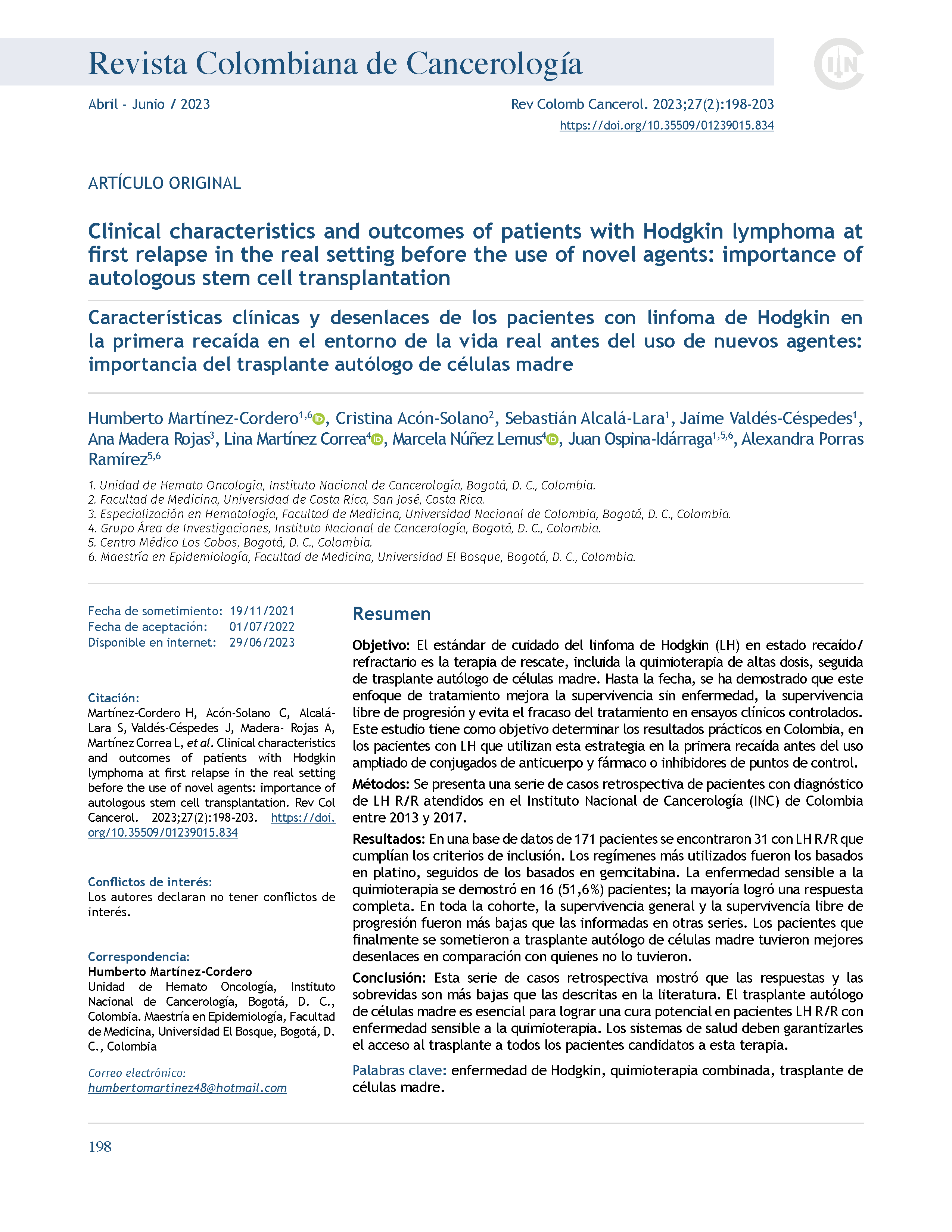Clinical characteristics and outcomes of patients with Hodgkin lymphoma at first relapse in the real setting before the use of novel agents: importance of autologous stem cell transplantation
DOI:
https://doi.org/10.35509/01239015.834Palabras clave:
Hodgkin disease, drug therapy, combination, stem cell transplantationResumen
Objective: The standard of care in first relapsed/refractory Hodgkin lymphoma (R/R HL) is salvage therapy, including high-dose chemotherapy (HDT), followed by autologous stem cell transplantation (ASCT). To date, this treatment approach has been shown to improve event-free survival (EFS), progression-free survival (PFS), and freedom from treatment failure (FFTF) in controlled clinical trials. This study aims to determine the outcomes of patients with HL using this strategy at first relapse but in real-world practice in Colombia before the widespread use of novel agents such as antibody-drug conjugates (ADCs) and checkpoint inhibitors (ICIs).
Methods: We present a retrospective case series of patients diagnosed with R/R HL treated at the Instituto Nacional de Cancerología (INC) (Bogotá, Colombia) between 2013 and 2017.
Results: We found 31 patients with R/R HL fulfilling the inclusion criteria from a 171 patients database. The most widely used regimens were platinum-based, followed by gemcitabine-based regimens. Chemotherapy-sensitive disease was demonstrated in 16 (51.6%) patients, where the majority achieved complete response (CR). In the entire cohort, overall survival (OS) and PFS were lower than the rates reported in other series. Patients who ultimately did undergo ASCT had the best PFS and OS compared to those who did not.
Conclusion: Our retrospective case series showed that responses and survivals are lower than those reported in the literature. ASCT is essential for achieving a potential cure in R/R HL patients with chemotherapy-sensitive disease. Health systems must guarantee access to transplantation for all patients who are candidates for this therapy.
Biografía del autor/a
Humberto Martínez-Cordero, Unidad de Hemato Oncología, Instituto Nacional de Cancerología, Bogotá, D. C., Colombia.
1. Unidad de Hemato Oncología, Instituto Nacional de Cancerología, Bogotá, D. C., Colombia.
6. Maestría en Epidemiología, Facultad de Medicina, Universidad El Bosque, Bogotá, D. C., Colombia.
Cristina Acón-Solano, Facultad de Medicina, Universidad de Costa Rica, San José, Costa Rica.
2. Facultad de Medicina, Universidad de Costa Rica, San José, Costa Rica.
Sebastián Alcalá-Lara, Unidad de Hemato Oncología, Instituto Nacional de Cancerología, Bogotá, D. C., Colombia.
1. Unidad de Hemato Oncología, Instituto Nacional de Cancerología, Bogotá, D. C., Colombia.
Jaime Valdés-Céspedes, Unidad de Hemato Oncología, Instituto Nacional de Cancerología, Bogotá, D. C., Colombia.
1. Unidad de Hemato Oncología, Instituto Nacional de Cancerología, Bogotá, D. C., Colombia
Ana Madera-Rojas, Especialización en Hematología, Facultad de Medicina, Universidad Nacional de Colombia, Bogotá, D. C., Colombia.
3. Especialización en Hematología, Facultad de Medicina, Universidad Nacional de Colombia, Bogotá, D. C., Colombia.
Lina Martínez Correa, Grupo Área de Investigaciones, Instituto Nacional de Cancerología, Bogotá, D. C., Colombia.
4. Grupo Área de Investigaciones, Instituto Nacional de Cancerología, Bogotá, D. C., Colombia.
Marcela Núñez Lemus, Grupo Área de Investigaciones, Instituto Nacional de Cancerología, Bogotá, D. C., Colombia.
4. Grupo Área de Investigaciones, Instituto Nacional de Cancerología, Bogotá, D. C., Colombia.
Juan Ospina-Idárraga, Unidad de Hemato Oncología, Instituto Nacional de Cancerología, Bogotá, D. C., Colombia.
1. Unidad de Hemato Oncología, Instituto Nacional de Cancerología, Bogotá, D. C., Colombia.
5. Centro Médico Los Cobos, Bogotá, D. C., Colombia.
6. Maestría en Epidemiología, Facultad de Medicina, Universidad El Bosque, Bogotá, D. C., Colombia.
Alexandra Porras Ramírez, Centro Médico Los Cobos, Bogotá, D. C., Colombia.
5. Centro Médico Los Cobos, Bogotá, D. C., Colombia.
6. Maestría en Epidemiología, Facultad de Medicina, Universidad El Bosque, Bogotá, D. C., Colombia.
Referencias bibliográficas
Sung H, Ferlay J, Siegel RL, Laversanne M, Soerjomataram I, Jemal A, Bray F. Global Cancer Statistics 2020: GLOBOCAN estimates of incidence and mortality worldwide for 36 cancers in 185 countries. CA Cancer J Clin. 2021 May;71(3):209-249. https://doi.org/10.3322/caac.21660
Pardo C, Cendales R. Incidencia, mortalidad y prevalencia de cáncer en Colombia, 2007-2011. Bogotá: Instituto Nacional de Cancerología; 2015. Available from: https://www.cancer.gov.co/recursos_user/files/libros/archivos/incidencia1.pdf
Duggan DB, Petroni GR, Johnson JL, Glick JH, Fisher RI, Connors JM, et al. Randomized comparison of ABVD and MOPP/ABV hybrid for the treatment of advanced Hodgkin's disease: Report of an intergroup trial. J Clin Oncol. 2003;21(5):607-14. https://doi.org/10.1200/JCO.2003.12.086
Shanbhag S, Ambinder RF. Hodgkin lymphoma: A review and update on recent progress. CA Cancer J Clin. 2018;68(2):116-32. https://doi.org/10.3322/caac.21438
Kuruvilla J. Standard therapy of advanced Hodgkin lymphoma. Hematology Am Soc Hematol Educ Program. 2009;497-506. https://doi.org/10.1182/asheducation-2009.1.497
Schmitz N, Pfistner B, Sextro M, Sieber M, Carella AM, Haenel M, et al. Aggressive conventional chemotherapy compared with high-dose chemotherapy with autologous hemopoietic stem-cell transplantation for relapsed chemosensitive Hodgkin's disease: a randomised trial. Lancet. 2002;359(9323):2065-71. https://doi.org/0.1016/S0140-6736(02)08938-9
Reddy NM, Perales MA. Stem cell transplantation in Hodgkin lymphoma. Hematol Oncol Clin North Am. 2014;28(6):1097-112. https://doi.org/10.1016/j.hoc.2014.08.011
Vassilakopoulos TP, Asimakopoulos JV, Konstantopoulos K, Angelopoulou MK. Optimizing outcomes in relapsed/refractory Hodgkin lymphoma: a review of current and forthcoming therapeutic strategies. Ther Adv Hematol. 2020;11:2040620720902911. https://doi.org/10.1177/2040620720902911
Jaime-Pérez JC, Gamboa-Alonso CM, Padilla-Medina JR, Jiménez-Castillo RA, Olguín-Ramírez LA, Gutiérrez-Aguirre CH, et al. High frequency of primary refractory disease and low progression-free survival rate of Hodgkin's lymphoma: a decade of experience in a Latin American center. Rev Bras Hematol Hemoter. 2017;39(4):325-30. https://doi.org/10.1016/j.bjhh.2017.08.001
Pinto JA, Pinillos L, Villarreal-Garza C, Morante Z, Villarán MV, Mejía G, et al. Barriers in Latin America for the management of locally advanced breast cancer. Ecancermedicalscience. 2019;13:897. https://doi.org/10.3332/ecancer.2019.897
Santoro A, Magagnoli M, Spina M, Pinotti G, Siracusano L, Michieli M, et al. Ifosfamide, gemcitabine, and vinorelbine: a new induction regimen for refractory and relapsed Hodgkin's lymphoma. Haematologica. 2007;92(1):35-41. https://doi.org/10.3324/haematol.10661
Horning JS. Hodgkin's Lymphoma. In: Abeloff MD, Armitage JO, Niederhuber JE, Kastan MB, McKenna WG, editors. Abeloff's clinical oncology. 4th ed. Philadelphia: Elsevier Churchill Livingstone; 2008. p. 2353-69. Available from: https://www.us.elsevierhealth.com/abeloffs-clinical-oncology-9780323476744.html
Garcia-Sanz R, Sureda A, Gonzalez A, De la Cruz F, Sanchez-Gonzalez B, Rodriguez A, et al. Brentuximab Vedotin Plus ESHAP (BRESHAP) is a highly effective combination for inducing remission in refractory and relapsed Hodgkin lymphoma patients prior to autologous stem cell transplant: A trial of the Spanish Group of Lymphoma and Bone Marrow Transplantation (GELTAMO). Blood. 2016;28(22):1109. https://doi.org/10.1182/blood.V128.22.1109.1109
Herrera AF, Moskowitz AJ, Bartlett NL, Vose JM, Ramchandren R, Feldman TA, et al. Interim results of brentuximab vedotin in combination with nivolumab in patients with relapsed or refractory Hodgkin lymphoma. Blood. 2018;131(11):1183-94. https://doi.org/10.1182/blood-2017-10-811224
Advani RH, Moskowitz AJ, Bartlett NL, Vose JM, Ramchandren R, Feldman TA, et al. Brentuximab vedotin in combination with nivolumab in relapsed or refractory Hodgkin lymphoma: 3-year study results. Blood. 2021;138(6):427-38. https://doi.org/10.1182/blood.2020009178
Cómo citar
Descargas

Descargas
Publicado
Número
Sección
Licencia
Derechos de autor 2023 Revista Colombiana de Cancerología

Esta obra está bajo una licencia internacional Creative Commons Atribución-NoComercial-SinDerivadas 4.0.
Todos los derechos reservados.

| Estadísticas de artículo | |
|---|---|
| Vistas de resúmenes | |
| Vistas de PDF | |
| Descargas de PDF | |
| Vistas de HTML | |
| Otras vistas | |



